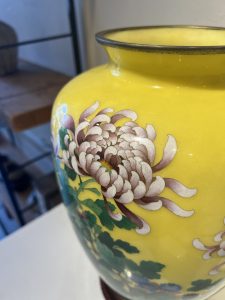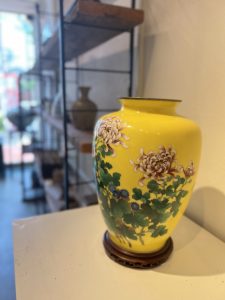重陽の節句(愛知県名古屋市千種区姫池通 骨董買取 古美術風光舎)
2024.09.08
みなさまこんにちは、スタッフYでございます。
9月に入り暦の歴では「白露」と呼ばれる時節に入りました。今年は2024年9月9日㈪から秋分の日前日の21日(土)までが「白露」と呼ばれる時節なのですが、実感はありませんよね。
「白露」とは、早朝などに草木の先や花に露が結び白く光って見える季節のことをあらわしていますが、そう言われましても名古屋はまだまだ暑い。
ところで、そんな白露の時節の最中の9月9日㈪は、五節句の一つ「重陽(ちょうよう)の節句」といわれる節句があることを最近知りました。みなさまご存知だったでしょうか。なくなったわけではないのですが、そんなことも知りもせずまあまあ長く暮らしておりました。
まず、五節句とは?と、思われるでしょう。五節句とは、1月7日の人日、3月3日の上巳、5月5日の端午、7月7日の七夕、9月9日の重陽のことなのですが、5つの季節の節目を祝う日本の伝統行事のようですが、中でも3月3日の節句は「桃の節句」、5月5日の節句は「端午の節句」とも呼ばれ、それぞれ「雛祭り」「こどもの日」として現在も祝われておりこちらは言わずもがな、この「重陽の節句」はどんなことをして何をお祝いするのでしょうか。
そもそもの重陽の節句の起源は中国からのようでして。9月9日は中国では縁起がよいとされている陽数(奇数のこと)のうち最も大きい「9」が重なる日ということでたいへん縁起がよい日と考えられてきました。この日中国では、小高い山に登って菊の花を浸した菊酒を飲んで、健康や長寿を願ったと言われております。菊の花は長生きの効能があると考えており「菊の節句」とも言われているようですね。
この風習は奈良時代頃に日本にも伝わり、平安時代には「重陽の節句」として宮中行事となり、江戸時代には庶民の間にも菊酒が広まりました。ですが、現代ではあまりしられていない節句となってしまいましたが、カレンダーなどをみていると確かに「重陽」と、今も記されております。
そういえば、現在放映中の大河ドラマ「光る君へ」において、少し前に「重陽の節句」が詠われた場面がありました。

お題は「酒」。こうした会では、お題の言葉を含めた相応しい歌を披露するのですが、古の偉人の詠んだものでもアリだったようです。道長は漢詩が苦手ということで、白居易(白楽天)が「重陽の節句」の時に詠んだ漢詩を披露しておりました。
賜酒盈杯誰共持
宮花滿把獨相思
相思只傍花邊立
盡日吟君詠菊詩

簡単に訳すと、
重陽の節句に賜った菊酒で杯は満たされているものの、一体誰とこれを飲めというのであろう。宮廷は花に満ちているが私は君を一人で想っている。君を想って菊の花の側にあり、日がな一日君が詠んだ菊花の詩を口ずさんでいる。
これは白楽天が、親友で優れた歌人であった元稹が詠んだ菊の詩があまりにすばらしくそれに返した詩のようですが、道長は自分がまひろを想う気持ちをこの歌に忍ばせて詠んだということなのでしょうか。
こんな風にちょっと大人の節句といいましょうか、健康や長寿を願ってのお祝いの節句でして、桃の節句や端午の節句のように現在はイベント化されている節句と比べますと、いたって派手さはないようです。ですが、実は縁起のよい日のようですね。
と、まぁ知ってしまった以上、明日は菊を浮かべたお酒を飲んだり、漢詩を詠うかどうかはともかく、折角ですので、気持ちだけはかつての宮中行事のような優雅な状況を想像しつつ健康や長寿を祈願してみようと思うのですが…。なにせ普通のお酒を普通の家で飲むのですから、間違いなく家族からは完全におかしな人だと思われそうです。
It is now September, and according to the calendar, we have entered the “White Dew” season. (In the year 2024, the “White Dew” is from September 7 (Sat) to September 21 (Sat), the day before the autumnal equinox, but you may not really feel it.
The term “white dew” refers to the time of year when dew forms on the tips of plants and flowers in the early morning, making them appear white and glistening, although it is still hot in Nagoya.
By the way, did you know that on September 9 (Mon.), in the middle of the “Shiro dew” season, there is a seasonal festival called “Chou-you-no-Sekku”, one of the five seasonal festivals? It is not that I have lost it, but I have been living for decades without knowing such a thing.
First of all, what are the five seasonal festivals? You may be wondering, “What are the five seasonal festivals?
The five seasonal festivals are January 7 (Jin-nichi), March 3 (Joushiki), May 5 (Tango), July 7 (Tanabata), and September 9 (Chou-you), and they seem to be traditional Japanese events to celebrate the five seasonal milestones.
Among them, March 3 is called “Momo no Sekku” and May 5 is called “Tango-no Sekku,” and they are celebrated as “Hina Matsuri” and “Children’s Day,” respectively, so these two festivals go without saying, but what does “Chou-you no Sekku” celebrate?
Originally, Chou-you-sekku originated in China, where September 9 is the day on which the largest number “9” among yang numbers (an odd number), which is considered auspicious in China, falls on top of each other, and thus was considered a day of great luck. On this day in China, people climbed a small mountain and drank chrysanthemum wine soaked in chrysanthemum flowers to pray for good health and long life. It is believed that chrysanthemum flowers have the effect of prolonging one’s life, and it is also called “Kiku-no-Sekku” (festival of chrysanthemums).
This custom was introduced to Japan around the Nara period (710-794), and became a court event in the Heian period (794-1185) as “Chou-you-no-Sekku,” and spread to the common people in the Edo period (1603-1868). It seems that it was celebrated until the Edo period, but nowadays it is not seen or heard of very often.
Come to think of it, there is a scene in the current Taiga Drama “Hikaru Kimi he” in which “Chou-you-no-Sekku” was recited some time ago.
In the scene, young Michinaga and Mahiro meet again at a Chinese poetry meeting hosted by his elder brother Michitaka. Michinaga was originally not good at Chinese poetry and seemed reluctant to attend the meeting hosted by his brother, but when he did attend, he found Mahiro there.
The theme of the meeting was “sake. At such a meeting, the participants were asked to present something appropriate, including the words of the theme, which could have been a poem written by a great person of the ancient times. Since Michinaga was not good at Chinese poetry, he performed a Chinese poem composed by Bai Juyi (Hakurakuten) on the occasion of “Chou-you-no-Sekku.
Gifted wine waxing and waning in the cup who holds it together
The palace is full of flowers
Standing by the flowers
The poem “Chrysanthemum Poem” was composed by Chinnichi Ginkun.
A simple translation is,
My cup is filled with the chrysanthemum wine given to me on Chou-you Festival, but with whom should I drink it? The court is full of flowers, but I am thinking of you alone. I am alone with you, beside the chrysanthemums, and all day long I hum the chrysanthemum poems that you have composed.
This poem seems to be a response to a poem about chrysanthemums composed by Shirakuten’s close friend and excellent poet, Genbaku, which was so wonderful.
It seems to be a bit like an adult’s seasonal festival, or perhaps a celebration to wish for good health and longevity. Although it does not seem to be an eventful Sekku like the current Momo-no-Sekku and Tango-no-Sekku, it is actually a “day of good luck” and a “day to wish for good health” Sekku, so it is good to think about September 9 with this in mind.
Regardless of whether I drink sake with chrysanthemums floating on it and recite Chinese poetry or not, tomorrow I will be drinking sake (ordinary sake) while praying for good health and longevity with the elegance of a former court ceremony, lol.
Have a good day.
*******************
ご実家の整理やお片付けなどをされている方のご相談などが多くございます。
お片付けなどくれぐれもご無理のないようになさってくださいませ。
風光舎では古美術品や骨董品の他にも絵画や宝石、趣味のお品など様々なジャンルのものを買受しております。
お片付けをされていて、こういうものでもいいのかしらと迷われているものでも、どうぞお気軽にご相談下さいませ。
また風光舎は、出張買取も強化しております。ご近所はもちろん、愛知県内、岐阜県、三重県その他の県へも出張いたします。
なお、毎月21日の持込鑑定会では無料鑑定・買取・ご相談など、ご予約なしで承っております。
ご近所の皆さま、ご遠方のみなさまも、お気軽にお越しくださいませ。
まずは、お電話お待ちしております。
愛知県名古屋市千種区姫池通
骨董 買取【古美術 風光舎 名古屋店】
TEL052(734)8444
10:00-18:00 OPEN
#出張買取#骨董#古美術#骨董品#絵画#版画#茶道具#刀剣#彫刻

